The word “Ekadashi” is derived from two Sanskrit words: “eka,” meaning “eleven,” and “dashi,” meaning “day.” Thus, Ekadashi refers to the 11th day of each lunar phase. Ekadashi holds great spiritual and religious significance, particularly those who follow Vaishnavism. Bhagwan Vishnu is one of the principal deities in Hinduism, the supreme one, and is revered as the preserver and protector of the universe.

What is Yogini Ekadashi?
Ekadashi is considered an auspicious day dedicated to Lord Vishnu, and it is believed that observing Ekadashi helps devotees gain spiritual merits and seek blessings from Narayana.
After the Nirjala Ekadashi is Yogini Ekadasi which is in the waning Moon phase or Krishna Paksha of the Hindu month of Ashadha, i.e. the month of June –July as per the Gregorian calendar. Yogini Ekadashi is also known as Ashadha-Krishna Ekadashi.
Yogini Ekadashi 2026: Tithi & Muhurat (Date & Time)
Yogini Ekadashi on Friday, July 10, 2026
On 11 th Jul, Parana Time - 02:03 PM to 04:42 PM
On Parana Day Hari Vasara End Moment - 10:32 AM
Ekadashi Tithi Begins - 08:16 AM on Jul 10, 2026
Ekadashi Tithi Ends - 05:22 AM on Jul 11, 2026
Yogini Ekadashi Parana
Gauna Yogini Ekadashi on Saturday, July 11, 2026
On 12 th Jul, Parana Time for Gauna Ekadashi - 06:08 AM to 08:47 AM
On Parana Day Dwadashi would be over before Sunrise
Ekadashi Tithi Begins - 08:16 AM on Jul 10, 2026
Ekadashi Tithi Ends - 05:22 AM on Jul 11, 2026
Those who observe the fast must break it after sunrise the next day after Ekadashi . Note that one should break the fast (Parana) within Dwadashi Tithi. Another important consideration is that one must not break the fast-during “Hari Vasara”, which is the fourth duration of Dwadashi. The best time to break the fast is “Pratahkala” (early morning).
About Yogini Ekadashi (Meaning):
The Ekadashi is considered a holy day when Hari or Vishnu is worshipped, and devotees observe a day and night long fast to please the Bhagwan. The term 'Ekadashi' means the eleventh day of the two Lunar cycles of the Hindu Calendar. This means Ekadashi falls on the eleventh day of the waxing Moon phase, known as Shukla Paksha, and on the waning Moon phase, called Krishna Paksha, respectively. So, the Ekadashi fast or Vrat is observed twice every month, and both Ekadashis, whether in Shukla Paksha or Krishna Paksha, have the same power.
Each Ekadashi Vrat has a story or Vrat Katha associated with it, which confirms the benefits of observing the Ekadashi Vrat/fast. Observing dry fast is considered the best type of fast for the day; however, keeping awake in awareness through the night, singing the praise of Sri Hari, is what completes the fast. If you sleep even for a moment at night, then the Ekadashi Vrat stands incomplete. It is believed that observing fast on Ekadashis helps attain Moksha, besides the other benevolent gifts of the Supreme God Vishnu

Click Here to Book Ekadashi Puja
Significance Of Yogini Ekadashi :
Yogini Ekadashi is an auspicious day, and observing fast on this day by following all the rules of Ekadashi carefully can wipe away all the sins of the individual and attain salvation. The importance of Yogini Ekadashi also lies in the belief that observing it can heal physical ailments and bestow good health upon the devotee.
The ancient Hindu texts, with
Shri Krishna
(an avatar of Vishnu), specify the importance of Ekadashi fast/vrat. Bhagwan Krishna said observing Ekadashi fast is greater than all sacrifices or charity to the needy, the sacrifice of Horses (Ashvamedha), or even seeing the reason of existence, Vishnu. It is said that one who observes the fast on this day, adhering to the rules, will be liberated and get a place in Vishnu's abode.
In the Yogini Ekadashi katha, Sri Krishna mentions that observing Yogini Ekadashi brings back the devotees to the spiritual path from getting drowned in the materialistic ocean of the world, giving Yogini Ekadashi a special significance.
Yogini Ekadashi “Puja Vidhi”:
Yogini Ekadashi Mantra:
'Om Namo Bhagavate Vasudevaya'
Meaning: I offer my obeisance to or bow down to Bhagwan Vasudeva or Shri Krishna.
First, get up early in the morning before sunrise and take a bath. You can the following mantra while bathing:
'Ganga Cha Yamuna Chaiva Godavari Saraswati, Narmada Sindhu Kaveri Jalesmin Sannidhim Kuru'
Translation: “In this water, I invoke the presence of divine waters from the rivers Ganga, Yamuna, Godavari, Saraswati, Narmada, Sindhu and Kaveri.” These rivers are considered goddesses and I pray to them for considering me for their blessings.”
- After the bath, it is time for a Vishnu puja. Light up an oil/ghee lamp (Diya).
- Offer Tulsi leaves, flowers, dhoop and lamp to Lord Vishnu.
- You can read or recite Vishnu Sahasranama (A thousand names of Vishnu). You can watch the video below
- It is the best time for Havan, rituals and fasting. At least one of them must be performed to please Lord Vishnu if possible.
- It is the best time to wear Rudraksha beads ruled by Narayana. A Ten Mukhi Rudraksha bead ruled by Bhagwan Krishna and a Nineteen Mukhi Rudraksha bead ruled by Shri Narayana is best to energise your devotional mood.
NOTE: For professional and devoted Puja services you may reach out to Rudra Centre.We have 250+ qualified “Karm-kandi” Pandits from Kashi specially curated by Sakhashree Neeta ji.
What To Do On Yogini Ekadashi Or Yogini Ekadashi Vrat Vidhi:
The rituals of Yogini Ekadashi are specified in the ancient Hindu texts and is said to have been specified by Lord Sri Krishna while answering Yudhishthira's (eldest of Pandava brothers from Mahabharata) query. The Yogini Ekadashi Vrat Vidhi are:
- One day before Yogini Ekadashi, which is the 10th day of the Krishna Paksha, the person should clean his/herself thoroughly in the afternoon and have supper at Sunset hour.
- On the morning of Yogini Ekadashi, the person should be intent on keeping the fast meticulously.
- Worship Shri Govinda with complete dedication and offer an excellent 'Bhog' (food to Divine) along with flowers, Sandalwood paste, Tulsi leaves, “dhoop” and other things of the offering.
- Light a Ghee lamp at home in honor of Bhagwan Vishnu.
- Chant or sing praises of Hari throughout the day and remain in a most blissful state during the fast.
- Stay awake through the night in full consciousness. If possible, play musical instruments throughout the night for Bhagwan.
- The next morning the person should give charity to Brahmanas and respectfully ask them for forgiveness for any offence.
- For people who keep a complete fast till the next day, one should say the prayer - 'O Pundarikaksha, O lotus-eyed Lord, now I will eat. Please shelter me'.
- After the prayer the devotee should offer flowers and water at the lotus feet of Lord Vishnu and request Bhagwan to eat by chanting the mantra of eight-syllable, thrice. To garner the full merits of the fast, the devotee should have water which has been offered to the Bhagwan’s lotus feet.
- Fire sacrifices can be performed if the devotee chooses to do so.
Fasting Rules of Yogini Ekadashi:
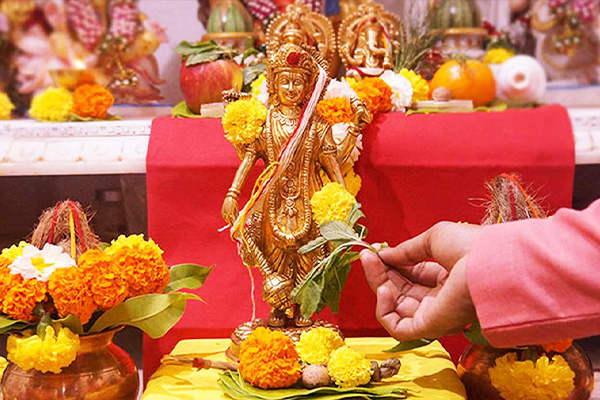
As per specifications in the ancient texts, to get the benefits of the fasting on Ekadashi the person should adhere to the rules strictly.
- The devotee observing fast should have a bath on the morning of Yogini Ekadashi.
- Beans and grains are prohibited to eat on Ekadashi.
- The killing of any animal is prohibited on this day for the devotee.
- Sleeping during the day is not allowed on Ekadashi and the next day is on Dvadashi.
- Abstinence from sex, gambling on Ekadashi and Dwadashi.
- On Dwadashi (the day after Ekadashi), devotees are not to eat in another person's house, have only one meal, Honey and Urad-dal (black lentil) been not to be consumed, eating on Bell metal plate or cutlery is prohibited and should not massage oil on the body.
- If due to any reason the devotee is not able to break the fast on the next day, then he/she should have water to signify the completion of the fast and later have food when convenient.
Prohibited Food Items For Yogini Ekadashi
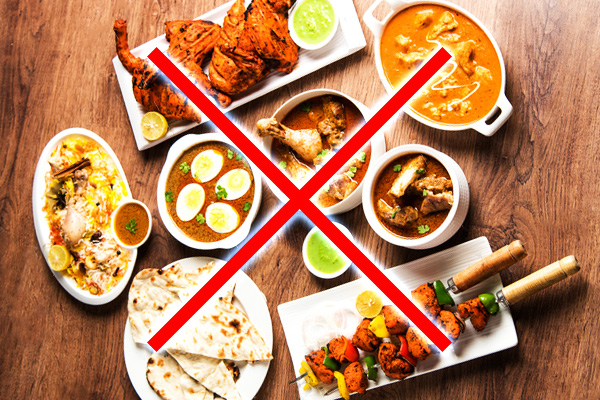
During Yogini Ekadashi fast, devotees typically cease from consuming grains, lentils, certain vegetables, and specific spices. Here are some food items that are usually avoided during this fast:
- Grains: Wheat, rice, barley, corn, millet, etc. are avoided as they are grains.
- Lentils and Legumes: Beans, chickpeas, lentils, peas, etc. are avoided due to their grain-like properties.
- Onions and Garlic: These are believed to increase urges and therefore are generally avoided during Ekadashi fasting.
- Brinjal (Eggplant): Some people avoid brinjal as it is believed to be tamasic (having qualities of passivity).
- Mushrooms: Similarly, mushrooms are considered tamasic and are avoided by some during Ekadashi fasting.
- Hing (Asafoetida): Some people avoid “hing” as it is believed to disturb the purity of the mind during fasting.
- Non-vegetarian Food: All forms of meat, fish, and eggs are avoided during the fast.
- Alcohol and Stimulants: Consumption of alcohol and stimulants like caffeine is prohibited during Ekadashi fasting.
- Fermented Foods: Fermented foods like yogurt, cheese, and vinegar are often avoided.
- Processed Foods: Packaged and processed foods containing additives, preservatives, and artificial flavors are generally avoided as they are considered impure.

Devotees usually settle for a simple diet consisting of fruits, nuts, milk products, root vegetables (like potatoes), and specific types of flours (such as water chestnut flour or Singhara flour) to prepare dishes. However, dietary preferences may vary based on regional customs and personal beliefs. It's necessary for individuals observing the fast to cohere to the guidelines prescribed by their tradition or spiritual beliefs.
Yogini Ekadashi Vrat Katha | Yogini Ekadashi Story:
The Yogini Ekadashi Vrat Katha is from the “Brahma-Vaivarta Purana”. King Yudhisthira humbly requests Shri Krishna to tell him about the Ekadashi that follows Nirjala Ekadashi. And Shri Krishna narrates the Yogini Ekadashi story:
Kubera, believed to be the treasurer of the Demi Gods (Devas) and the King of Alakapuri, was a great devotee of Shiva. He worshipped the God daily, offering flowers and many other items of worship. Kubera had specially appointed a gardener named Hemamali, whose job was to go to Lake Manasarovar and bring back flowers for his master, Kubera, for the worship of Shiva.
Hemamali's wife, Swarupavati, was young and beautiful, and Hemamali always felt an intense physical attraction to her. Once, after collecting flowers from Lake Mansarovar, he went straight to his wife and engaged in physical intimacy. When it was time to worship Shiva, Kubera found no flowers and asked one of his messengers to find out about Hemamali's whereabouts. Later, upon learning about Hemamali's engagement, Kubera became very angry and summoned his gardener to his palace.
A scared Hemamali arrived in front of his master, knowing that he had failed to perform his duty. In his anger, Kubera cursed Hemamali to immediately suffer from white leprosy and expelled him from Alkapuri to a lower planet. The curse manifested, and Hemamali found himself afflicted with the miserable disease of white leprosy, wandering aimlessly in a jungle, suffering terribly in all seasons. However, since Hemamali used to worship Bhagwan Shiva, his faith kept him steady in mind.
While wandering in the Himalayan Mountain range, Hemamali came upon the great Sage Markandeya Rishi. It was a fortunate day for Hemamali because the kind Markandeya Rishi, upon hearing the reason for his disease, advised Hemamali to observe the Yogini Ekadashi fast and told him about the merits and rituals of the fast. Overwhelmed, Hemamali expressed his gratitude and strictly observed the fast on the day of Yogini Ekadashi as per the instructions given by Rishi Markandeya. This resulted in miraculous healing, as the curse of Kubera was lifted, and Hemamali was cured of white leprosy, regaining his original healthful body. He spent the rest of his life happily with his wife in their rightful realm.
At the end of the Yogini Ekadashi Katha, Bhagwan Sri Krishna tells King Yudhisthira that observing strict fasting on Yogini Ekadashi is equivalent to the merits earned by feeding eighty-eight thousand Brahmins.
Benefits Of Yogini Ekadashi Vrat
- For health, wealth and success
- For fulfillment of wishes
- For spiritual growth
- For the blessing of Lord Vishnu
- Helps you practice discipline and control over your cravings.
- It gives your body a break, helping it get rid of toxins and feel more energetic.
- Fasting lets your digestive system rest, making digestion smoother and nutrient absorption better.
- Skipping meals can help manage weight by cutting down on calories.
- It may speed up your metabolism, keeping your body functioning well.
- Fasting under control can help stabilize blood sugar levels.
- It can bring mental clarity and a sense of calm, helping you feel more centered.
- Some research indicates that fasting can help us reach a state of autophagy which helps in getting rid of damaged cells in the body & also repair cells and body organs.
Yogini Ekadashi “Daan” (Donation):
.jpg)
Donation on Yogini Ekadashi is considered highly auspicious and commendable. Here are some suggested items to donate on this sacred day:
Food items:
- Rice, wheat, and other grains.
- Fruits and vegetables.
- Cooked meals to the needy and hungry.
Click Here to Book Food Donation (Ann Daan)
Clothing:
- New clothes for the poor and underprivileged.
- Warm clothes, blankets, and shawls, especially in cold areas or winter seasons.
Click Here to Book Clothes Donation (Vastra Daan)
Money and benefaction:
- Financial donations to temples, charitable organisations, or directly to those in need.
- Supporting the education of underprivileged children by donating to schools or educational charities.
Religious Items:
- Books on spirituality and religious scriptures.
- Items used in worship like incense sticks, diyas (lamps).
Shelter and Support:
- Donating to shelters for the homeless or animal shelters.
- Contributing to the construction of schools, hospitals, and community centres.
Cows and Animal Care:
- Donating to goshala (cow shelters) or animal welfare organisations.
- Providing food & fodder and other essentials for animals.
Click Here to Book Cow Donation (Gau Daan)
While making donations, it's important to do so with a pure heart and the intent to help and uplift others. This selfless act of charity not only benefits the recipients but also brings spiritual merit to the donor. Observing these practices on Yogini Ekadashi is believed to cleanse one's soul, remove past sins, and attract divine blessings.


-in-Astrology.jpg)
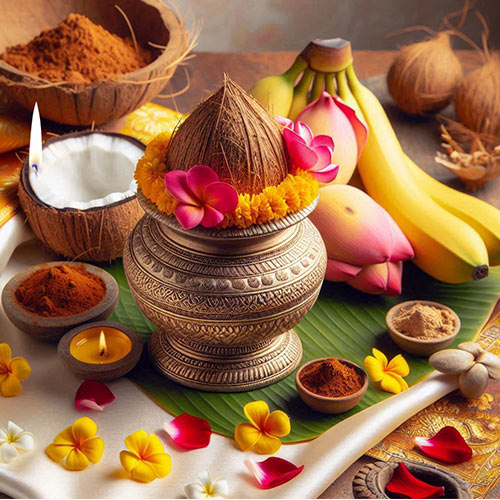


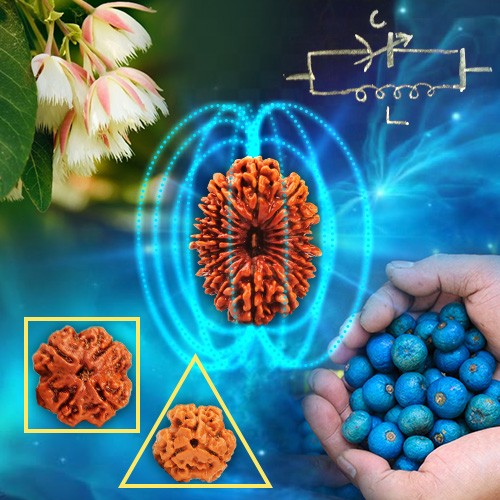


.jpg)

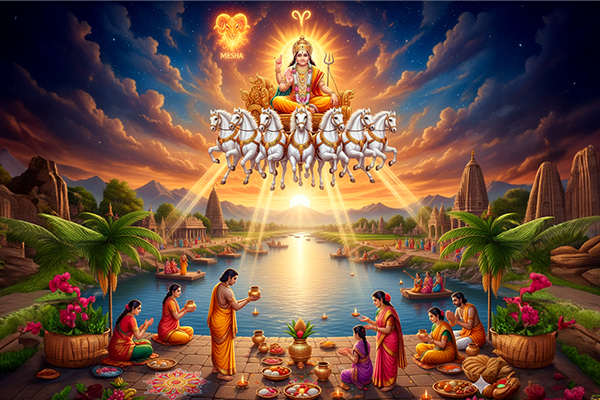

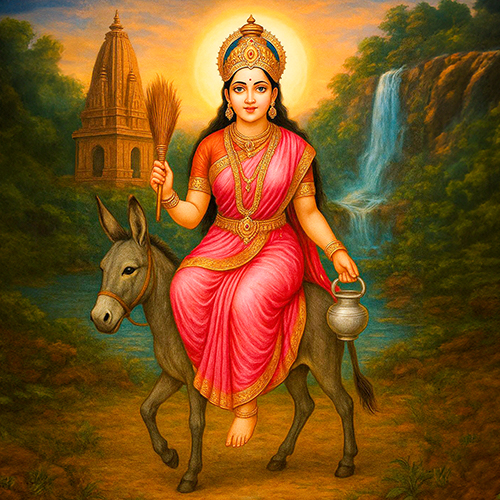
Comments 0
Leave your thought here